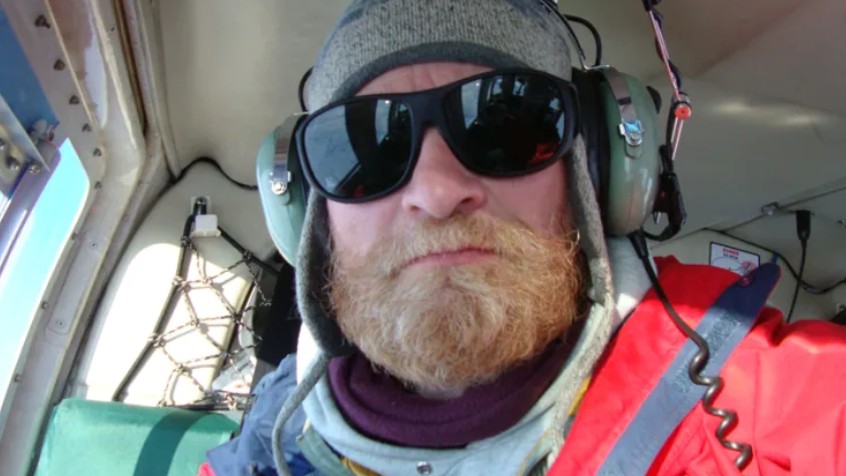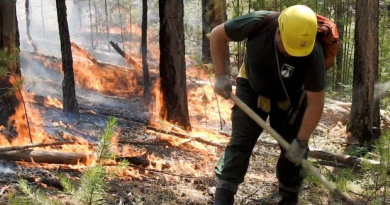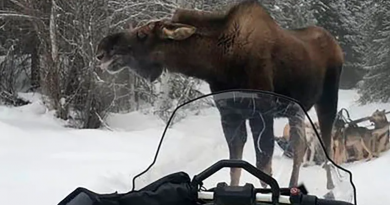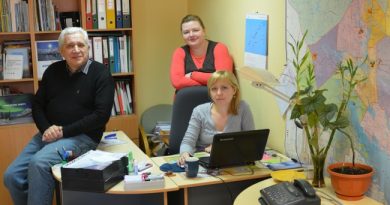‘Complete devastation’: Renowned polar bear biologist mourned after helicopter crash in Arctic Canada

Scientist Markus Dyck was identified by friends as 1 of 3 victims
Scientists are mourning the loss of leading Canadian polar bear scientist Markus Dyck, who was one of three people on board a helicopter that crashed near Resolute Bay, Nunavut, on Sunday.
A close friend of Dyck’s, Harvey Lemelin, said he was in “denial” when he first heard the news.
“I was looking for confirmation. I was hoping everybody was wrong. And then you find out that it’s real — complete devastation,” Lemelin said.
Dyck was surveying bear populations in Lancaster Sound for the Nunavut government on the day the helicopter crashed. Two other air crew also died.
Lemelin said Dyck was outspoken in his advocacy for community-based polar bear management.
“Markus was one of those individuals that fell in love with the bears and highly respected them and dedicated his life to them,” he said.
Lemelin said Dyck told him two weeks ago that he was heading out for field work.
“He was working for Nunavut and working with incorporating traditional knowledge and scientific knowledge and examining all types of research and doing those very important sample counts that are necessary.”
The Igloolik-based scientist challenged environmental groups that said the bears were disappearing. He also championed including traditional knowledge in research, Lemelin said.
“What he was concerned with is the ability of Inuit people and Cree people to live with the polar bears to continue traditional harvesting practices and to manage polar bears sustainably and respectfully, in the long-term,” Lemelin said.
‘A character’
Researcher Andrew Derocher, a professor of biological sciences at the University of Alberta in Edmonton, said he worked with Dyck for years.
“Markus was a character,” Derocher said. “He didn’t suffer fools but had a wry sense of humour and always had a slightly mischievous look in his eye.”
He said the news spread of Dyck’s death throughout Canada’s small polar bear community on Monday, and among the many international researchers Dyck had worked with.
“It rocketed around the world, the news, and just disbelief and shock really hit everybody,” Derocher said.
“It’s … sadness, and a sense of loss.”
Derocher said working in the High Arctic can expose people to risks, mostly tied to rough weather conditions, especially while flying.
“It’s a type of work [where] we know there is high danger involved.”
Irreplaceable skills
Dyck started out in Churchill in the 90s, said Derocher, studying the interaction of tourism and polar bears, “which is still something that we don’t know very much about.”
Derocher said Dyck also worked for the Nunavut government for many years, characterizing him as “by far” one of the most experienced field biologists internationally and within Canada.
He said Dyck’s hope to do the best for both polar bears and the local community was at the forefront of everything he did.
“You just don’t replace somebody with those skill sets and that breadth of knowledge and that integration in the communities is so valuable,” he said. “It’s really hard to express just how big a loss it is.”
The Transportation Safety Board is still investigating the crash. On Wednesday, Yukon Premier Sandy Silver offered his condolences to the family and friends of the crash victims.
“This loss is felt across the North, especially among our traditional knowledge, scientific and remote flight community who know first-hand the risks associated with the important work we do for our shared environment and wildlife,” Silver said in a statement.
“We are so very saddened by this horrible accident and wish the investigators good weather and safe travels as they endeavour to find some answers for all of us.”
– With files from Kate Kyle and Carol Off
Related stories from around the North:
Canada: Canadian hunter survives 4 days on the land with no food, plenty of polar bears, CBC News
Norway: Polar bear kills Dutch citizen on Norway’s remote Svalbard Islands, The Independent Barents Observer
Russia: Scientists raise alarm about polar bears’ plastic consumption in Arctic Russia, The Independent Barents Observer



